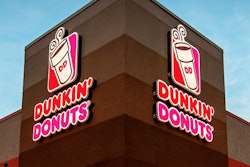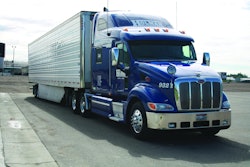Canton, MA: Dunkin' Brands Group published Serving Responsibly, the company's first Corporate Social Responsibility (CSR) report. The report offers a detailed overview of Dunkin' Brands' current CSR initiatives as well as key areas of focus for the future, such as nutrition, sourcing and packaging.
Serving Responsibly outlines Dunkin' Brands' ongoing commitment to grow its business in a sustainable manner while taking into consideration the needs of guests, employees, franchisees, local communities and the environment. The creation of the report follows Dunkin' Brands' membership in 2009 into Ceres, a network of investors, environmentalists and other public interest groups that works with companies to address sustainability challenges.
Key highlights of the report include:
- Nutrition – Dunkin' Brands offers guests a variety of better-for-you options and nutrition information so they can make the best choices for themselves. The DDSMART and BRight Choices menus include food and beverages that fit any lifestyle or dietary wants and needs. Additionally, the company's Nutrition Advisory Board, comprised of leading experts on nutrition, health and wellness, provides research and insight into new health and wellness trends and helps Dunkin' Brands incorporate current nutritional science in menu development.
- Sustainable Sourcing – Dunkin' Donuts was the first national brand to sell espresso beverages made exclusively with 100 percent Fair Trade Certified coffee, helping farmers and their families earn a better income and invest in the quality of their harvest. By the end of 2010, Dunkin' Brands purchased nearly 26 million pounds of Fair Trade Certified coffee and delivered approximately $1.9 million in premiums back to farming communities.
- Environmental Impact – In 2008, Dunkin' Brands opened its first "green" restaurant, in St. Petersburg, Florida, which achieved Leadership in Energy and Environmental Design (LEED) Silver certification in 2010. A second green restaurant will open later this year. The company implements many findings from its LEED restaurant to help make its restaurants greener. The company is actively engaged in finding more sustainable building solutions and utility options that reduce costs for franchisees while benefiting the environment.
- Support for local communities – Over the years, Dunkin' Brands and its franchisees have given millions of dollars to non-profit organizations supporting a variety of local community causes, including Special Olympics, American Red Cross, The Jimmy Fund/Dana-Farber Cancer Institute, Toys for Tots, and countless more. In the education arena alone, over the past 15 years, the company and its franchisees have provided more than $3 million in scholarships to high school seniors and college students.
In 2007, Dunkin' Donuts became the first major QSR brand to introduce a donut with zero grams trans fat. All Dunkin' Donuts menu offerings nationwide have been zero grams trans fat since October 2007. Baskin-Robbins' offerings, including its ice cream inclusions and ribbons, became zero grams trans fat in 2008.
Dunkin' Brands strives to offer packaging that balances the expectations of guests and franchisees while minimizing impact on the environment. In collaboration with its suppliers, peers and external experts, Dunkin' Brands is aggressively exploring alternative materials, recycling and waste reduction opportunities, with priority placed on identifying viable substitutes for Dunkin' Donuts' foam cups and Baskin-Robbins' polystyrene pink spoons.
The Dunkin' Donuts & Baskin-Robbins Community Foundation (DDBRCF) serves the needs of local communities through initiatives that provide food for the hungry, support children's health and wellness and ensure neighborhoods are safe and secure. Since its inception in 2006, The DDBRCF has awarded more than $2 million in grants, and has established long-term partnerships with Feeding America, the USO, National Fallen Firefighters Foundation and Do Something.
"Serving Responsibly is more than just a title; it's the guiding principle behind Dunkin' Brands' CSR efforts," says Karen Raskopf, Dunkin' Brands' senior vice president of communications and co-chair of The Dunkin' Donuts & Baskin-Robbins Community Foundation. "We have made good progress in many areas, such as providing more nutritional information for our guests and decreasing the impact of our packaging on the environment, while recognizing there is still much more for us to do. This report represents not only our achievements from the beginning of our CSR journey, but more importantly our commitment to continuing to address the social and environmental issues that face our business."














